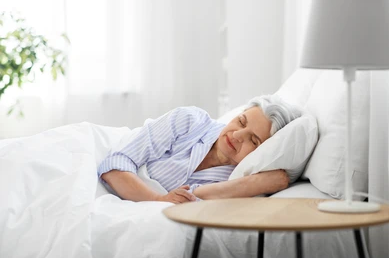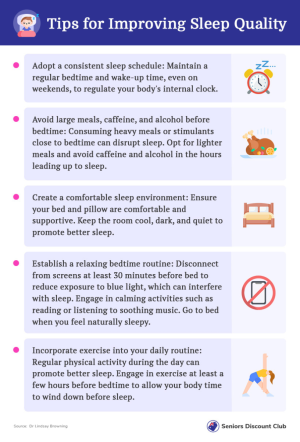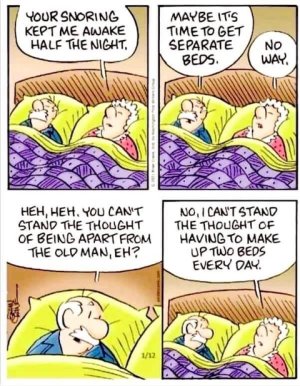Think you know how to get a good night's sleep? Expert busts nine myths and reveal the secret to catching Z's
By
- Replies 7
We all know the struggle of falling asleep, especially when the mind is racing and sleep seems elusive.
Over the years, many myths and bedtime rituals have emerged in an attempt to conquer sleepless nights.
However, sleep guru Dr Lindsay Browning, a member of the British Psychological Society, is here to dispel some of the most popular sleep myths.
In collaboration with retailer And So To Bed, Dr Browning debunked nine common misconceptions about sleep, shedding light on what works and what doesn't to achieve a good night's rest.

Counting sheep
Parents often advise their children to count sheep as a way to settle down for the night. While this technique might work for kids, it's not an effective remedy for adults.
Dr Browning suggests more engaging distraction techniques.
‘There's no harm in counting sheep, but you will have a much easier time if you set yourself something more taxing,’ she says.
‘Some better distraction techniques would be listing your top ten favourite movies or counting backwards in 7s from 1000.'
Cheese nightmares
The notion that eating cheese before bed triggers nightmares has been circulating for years.
However, Dr Browning argues that cheese may actually aid sleep due to its tryptophan content, which helps produce melatonin, the sleep hormone.
She clarifies that going to bed on a full stomach, regardless of the food, can lead to longer periods of REM sleep and potentially vivid dreams or nightmares.
Alcohol as a sleep aid
While alcohol might initially make you sleepy, it disrupts the natural REM cycle and can lead to poor sleep quality.
Dr Browning explains: ‘As such, our bodies will wake us up throughout the night and make it more difficult to fall back to sleep.’
She recommends avoiding alcohol consumption at least four hours before bed to allow the body time to clear it from the system, preventing sleep interruptions.
Napping habits
Taking a quick nap during the day can be tempting, especially when fatigue sets in.
However, hour-long naps can leave you feeling groggy due to waking up from the deepest part of sleep, resulting in sleep inertia.
Sleep inertia is a common experience of temporary disorientation and grogginess that occurs upon waking up. While it may seem harmless, it can actually have negative effects on our level of activity throughout the day.
Dr Browning says: 'Napping should not become a replacement for regular nighttime sleep as it could perpetuate your poor sleep at night.’
'If you get too much sleep during the day, you may have problems sleeping at night due to being too awake.’
'Much like food, if you have a snack before your dinner, you won't be hungry for your main meal — if you have a nap too near to bedtime, you might find it especially hard to fall asleep at night as you won't be as sleepy.'
Dr Browning suggests short 10-20 minute power naps to feel refreshed without experiencing sleep inertia.
The myth of unlimited sleep
Getting plenty of sleep might seem like a dream come true, but regularly exceeding nine hours of sleep can have adverse health effects, including obesity and strokes.
Dr Browning warns that excessive sleep can indicate poor sleep quality, emphasising that the restorative benefits of quality sleep are more valuable than simply clocking in longer hours.
Weekend lie-ins
While a Sunday morning lie-in might seem appealing, Dr Browning asserts that relying on weekends to make up for sleep deprivation can create a false sense of recovery.
Dr Browning explains: ‘Being sleep deprived and then relying on the weekend to recover may help in the short term, but in the long run extra rest may create a false sense of recovery.’
'Also, if you are struggling to fall asleep during the week, then a lie-in at the weekend may make this worse.'
Consistency in sleep schedules is crucial for mental and physical health.
By maintaining a regular sleep routine throughout the week, including weekends, you can feel more refreshed and energised overall.
Staying in bed if you can’t fall asleep
When sleep eludes you, lying in bed for hours isn't the solution. Dr Browning advises that if you haven't fallen asleep within 20 minutes, it's best to get out of bed and engage in a relaxing activity.
She remarked: 'If you stay in bed, trying to force sleep to happen, it will likely have the opposite effect as you will become more and more anxious and frustrated with your inability to fall asleep.’
'It's much better to take a break from trying to force sleep and failing before trying again after that break.'
Listening to music, reading a book, or disconnecting from electronic devices can help ease anxiety and frustration associated with struggling to sleep.
Watching TV before bedtime
While watching TV before bed might seem like a relaxing activity, the bright light emitted from modern televisions can disrupt the brain's production of melatonin, affecting the body's internal clock or circadian rhythm.
Instead, Dr Browning suggests engaging in activities like relaxing yoga or reading a book to unwind before sleep.
Dr Browning explains: ‘If your brain is more stimulated (especially by something stressful or anxiety-provoking), it's likely sleep will be disrupted, which in the long run, could lead to depression and anxiety.’
Optimal sleeping temperature
Contrary to popular belief, sleeping in a warm room is not ideal. Dr Browning recommends a temperature range of 16-19 degrees Celsius for optimal sleep.
As we fall asleep, our core body temperature naturally drops, and a cooler room facilitates this process.
Dr Browning suggests: ‘The room needs to be cool enough to allow that to happen. Try opening a window for a cool breeze and see if your sleep improves.’

There you have it, folks! Sleep is a vital aspect of our well-being, and poor sleep can have a profound impact on our physical and mental health.
By dispelling common misconceptions and embracing evidence-based practices, individuals can take proactive steps towards better sleep.
Do you follow any of these tips? Better yet, do you know other tricks for improving the quality of your sleep? Share them with us in the comments below!
We also recommend checking out this article for more ‘myths’ busted by science.
Over the years, many myths and bedtime rituals have emerged in an attempt to conquer sleepless nights.
However, sleep guru Dr Lindsay Browning, a member of the British Psychological Society, is here to dispel some of the most popular sleep myths.
In collaboration with retailer And So To Bed, Dr Browning debunked nine common misconceptions about sleep, shedding light on what works and what doesn't to achieve a good night's rest.

Some sleeping ‘tips’ can actually do more harm than good, according to sleep expert Dr Lindsay Browning. Credit: Shutterstock.
Counting sheep
Parents often advise their children to count sheep as a way to settle down for the night. While this technique might work for kids, it's not an effective remedy for adults.
Dr Browning suggests more engaging distraction techniques.
‘There's no harm in counting sheep, but you will have a much easier time if you set yourself something more taxing,’ she says.
‘Some better distraction techniques would be listing your top ten favourite movies or counting backwards in 7s from 1000.'
Cheese nightmares
The notion that eating cheese before bed triggers nightmares has been circulating for years.
However, Dr Browning argues that cheese may actually aid sleep due to its tryptophan content, which helps produce melatonin, the sleep hormone.
She clarifies that going to bed on a full stomach, regardless of the food, can lead to longer periods of REM sleep and potentially vivid dreams or nightmares.
Alcohol as a sleep aid
While alcohol might initially make you sleepy, it disrupts the natural REM cycle and can lead to poor sleep quality.
Dr Browning explains: ‘As such, our bodies will wake us up throughout the night and make it more difficult to fall back to sleep.’
She recommends avoiding alcohol consumption at least four hours before bed to allow the body time to clear it from the system, preventing sleep interruptions.
Napping habits
Taking a quick nap during the day can be tempting, especially when fatigue sets in.
However, hour-long naps can leave you feeling groggy due to waking up from the deepest part of sleep, resulting in sleep inertia.
Sleep inertia is a common experience of temporary disorientation and grogginess that occurs upon waking up. While it may seem harmless, it can actually have negative effects on our level of activity throughout the day.
Dr Browning says: 'Napping should not become a replacement for regular nighttime sleep as it could perpetuate your poor sleep at night.’
'If you get too much sleep during the day, you may have problems sleeping at night due to being too awake.’
'Much like food, if you have a snack before your dinner, you won't be hungry for your main meal — if you have a nap too near to bedtime, you might find it especially hard to fall asleep at night as you won't be as sleepy.'
Dr Browning suggests short 10-20 minute power naps to feel refreshed without experiencing sleep inertia.
The myth of unlimited sleep
Getting plenty of sleep might seem like a dream come true, but regularly exceeding nine hours of sleep can have adverse health effects, including obesity and strokes.
Dr Browning warns that excessive sleep can indicate poor sleep quality, emphasising that the restorative benefits of quality sleep are more valuable than simply clocking in longer hours.
Weekend lie-ins
While a Sunday morning lie-in might seem appealing, Dr Browning asserts that relying on weekends to make up for sleep deprivation can create a false sense of recovery.
Dr Browning explains: ‘Being sleep deprived and then relying on the weekend to recover may help in the short term, but in the long run extra rest may create a false sense of recovery.’
'Also, if you are struggling to fall asleep during the week, then a lie-in at the weekend may make this worse.'
Consistency in sleep schedules is crucial for mental and physical health.
By maintaining a regular sleep routine throughout the week, including weekends, you can feel more refreshed and energised overall.
Staying in bed if you can’t fall asleep
When sleep eludes you, lying in bed for hours isn't the solution. Dr Browning advises that if you haven't fallen asleep within 20 minutes, it's best to get out of bed and engage in a relaxing activity.
She remarked: 'If you stay in bed, trying to force sleep to happen, it will likely have the opposite effect as you will become more and more anxious and frustrated with your inability to fall asleep.’
'It's much better to take a break from trying to force sleep and failing before trying again after that break.'
Listening to music, reading a book, or disconnecting from electronic devices can help ease anxiety and frustration associated with struggling to sleep.
Watching TV before bedtime
While watching TV before bed might seem like a relaxing activity, the bright light emitted from modern televisions can disrupt the brain's production of melatonin, affecting the body's internal clock or circadian rhythm.
Instead, Dr Browning suggests engaging in activities like relaxing yoga or reading a book to unwind before sleep.
Dr Browning explains: ‘If your brain is more stimulated (especially by something stressful or anxiety-provoking), it's likely sleep will be disrupted, which in the long run, could lead to depression and anxiety.’
Optimal sleeping temperature
Contrary to popular belief, sleeping in a warm room is not ideal. Dr Browning recommends a temperature range of 16-19 degrees Celsius for optimal sleep.
As we fall asleep, our core body temperature naturally drops, and a cooler room facilitates this process.
Dr Browning suggests: ‘The room needs to be cool enough to allow that to happen. Try opening a window for a cool breeze and see if your sleep improves.’
Key Takeaways
- Sleep expert Dr Lindsay Browning debunked nine top sleep myths, including counting sheep, eating cheese before bed, and consuming alcohol before bed.
- Engaging in mentally stimulating activities, such as listing favourite movies or counting backwards, can be more effective in helping you fall asleep than counting sheep.
- Cheese contains tryptophan, which helps produce melatonin, the sleep hormone, and consuming it before bed can aid sleep.
- Dr Browning advises maintaining a consistent sleep schedule, cooler room temperature, and engaging in calming activities before bed to improve sleep quality.
There you have it, folks! Sleep is a vital aspect of our well-being, and poor sleep can have a profound impact on our physical and mental health.
By dispelling common misconceptions and embracing evidence-based practices, individuals can take proactive steps towards better sleep.
Do you follow any of these tips? Better yet, do you know other tricks for improving the quality of your sleep? Share them with us in the comments below!
We also recommend checking out this article for more ‘myths’ busted by science.









